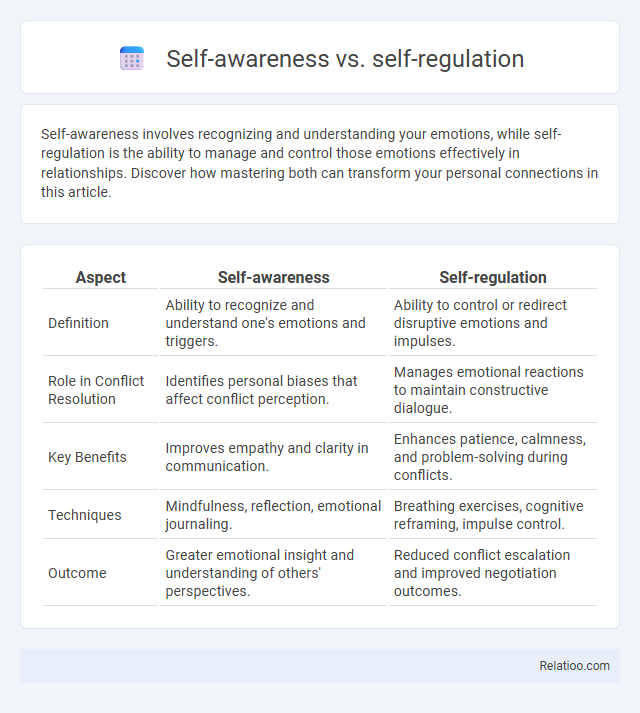Self-awareness involves recognizing and understanding your emotions, while self-regulation is the ability to manage and control those emotions effectively in relationships. Discover how mastering both can transform your personal connections in this article.
Table of Comparison
| Aspect | Self-awareness | Self-regulation |
|---|---|---|
| Definition | Ability to recognize and understand one's emotions and triggers. | Ability to control or redirect disruptive emotions and impulses. |
| Role in Conflict Resolution | Identifies personal biases that affect conflict perception. | Manages emotional reactions to maintain constructive dialogue. |
| Key Benefits | Improves empathy and clarity in communication. | Enhances patience, calmness, and problem-solving during conflicts. |
| Techniques | Mindfulness, reflection, emotional journaling. | Breathing exercises, cognitive reframing, impulse control. |
| Outcome | Greater emotional insight and understanding of others' perspectives. | Reduced conflict escalation and improved negotiation outcomes. |
Understanding Self-Awareness: Defining the Concept
Self-awareness involves recognizing your emotions, thoughts, and behaviors, forming the foundation for personal growth and effective decision-making. It enables you to accurately perceive your strengths and weaknesses, fostering a deeper understanding of how your internal state influences external actions. Developing self-awareness enhances emotional intelligence, paving the way for more effective self-regulation in managing impulses and responses.
What Is Self-Regulation? Meaning and Importance
Self-regulation refers to the ability to manage one's emotions, thoughts, and behaviors effectively in different situations to achieve long-term goals. It involves controlling impulses, maintaining focus, and adapting to changing circumstances, which is essential for personal and professional success. Mastering self-regulation enhances emotional intelligence, decision-making, and stress management, leading to improved relationships and overall well-being.
Key Differences Between Self-Awareness and Self-Regulation
Self-awareness involves recognizing and understanding your emotions, thoughts, and behaviors, while self-regulation refers to managing and controlling those emotions and behaviors effectively. The key difference lies in self-awareness being the foundation for identifying your internal states, whereas self-regulation is the skill to adjust your responses in alignment with goals or social norms. Mastering these concepts empowers your personal growth and emotional intelligence.
How Self-Awareness Influences Personal Growth
Self-awareness enhances personal growth by enabling individuals to recognize their emotions, strengths, and weaknesses, which sets the foundation for meaningful self-regulation. By understanding internal states and behavioral triggers, people can intentionally manage reactions and develop healthier habits. This mindful insight fosters emotional intelligence, resilience, and continuous improvement in both personal and professional contexts.
The Role of Self-Regulation in Emotional Intelligence
Self-regulation is a critical component of emotional intelligence that allows individuals to manage their emotions effectively, maintaining control over impulsive responses and adapting to changing circumstances. Unlike self-awareness, which involves recognizing and understanding one's emotions, self-regulation emphasizes the ability to modulate those emotions to achieve desired outcomes and maintain interpersonal harmony. Mastery of self-regulation supports resilience, decision-making, and social interactions by promoting calmness and thoughtful responses in emotionally charged situations.
Developing Self-Awareness: Effective Strategies
Developing self-awareness involves recognizing your emotions, thoughts, and behaviors to understand their impact on your decisions and actions. Effective strategies include mindfulness practices, journaling, and seeking feedback from others to gain deeper insights into your internal experiences. Enhancing self-awareness forms the foundation for self-regulation, enabling you to manage impulses and responses more consciously.
Practical Techniques to Enhance Self-Regulation
Self-regulation, distinct from self-awareness and often building upon it, involves managing emotions and behaviors to achieve long-term goals and maintain social harmony. Practical techniques to enhance self-regulation include mindfulness meditation, cognitive reappraisal, and controlled breathing exercises, which help reduce impulsive reactions and increase emotional resilience. Consistent practice of these methods improves executive function, enabling better decision-making and stress management in challenging situations.
Self-Awareness vs Self-Regulation: Real-Life Scenarios
Self-awareness involves recognizing your emotions and understanding their impact on your thoughts and behavior, while self-regulation is the ability to manage and control those emotions to respond appropriately in various situations. In real-life scenarios, self-awareness helps you identify stress triggers at work, whereas self-regulation enables you to stay calm during high-pressure meetings or conflicts. Mastering both skills enhances your emotional intelligence, leading to better decision-making, improved relationships, and greater personal growth.
Benefits of Balancing Self-Awareness and Self-Regulation
Balancing self-awareness and self-regulation enhances emotional intelligence, leading to better decision-making and stress management. High self-awareness allows individuals to identify emotions accurately, while self-regulation enables control over impulsive reactions and promotes resilience. Together, these skills improve interpersonal relationships and support personal and professional growth.
Cultivating Both Skills for Holistic Well-Being
Self-awareness involves recognizing your emotions and thoughts, while self-regulation is the ability to manage and control those impulses effectively. Cultivating both skills enhances emotional intelligence, leading to improved decision-making, stress management, and interpersonal relationships. Developing self-awareness and self-regulation together fosters holistic well-being by promoting mental clarity and emotional stability.

Infographic: Self-awareness vs Self-regulation
 relatioo.com
relatioo.com